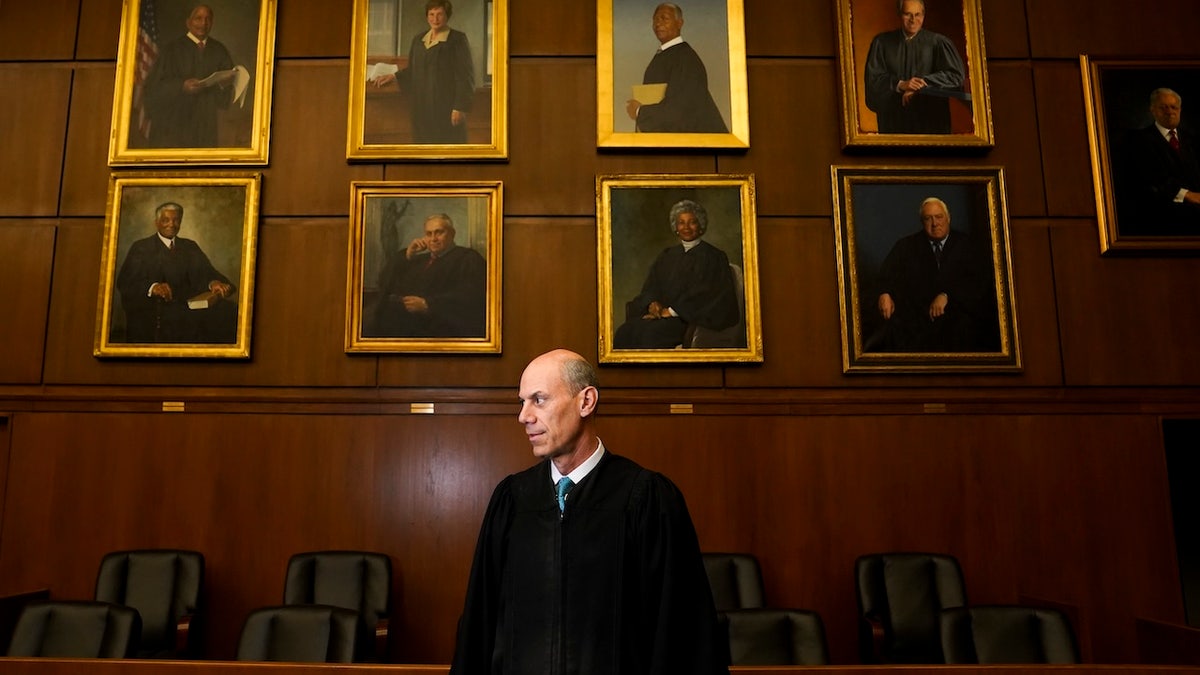INTERNACIONAL
Boasberg grills DOJ over remarks from Trump and Noem, floats moving migrants to Gitmo in action-packed hearing

U.S. District Judge James Boasberg pressed Justice Department lawyers Wednesday evening over public comments President Donald Trump and other Cabinet officials made about deportation proceedings under the Alien Enemies Act and floated the idea of moving some migrants to Guantánamo Bay.
During the hearing, Boasberg specifically pressed Justice Department lawyers about statements made by Trump and DHS Secretary Kristi Noem about CECOT, the maximum-security prison in El Salvador where the U.S. has deported hundreds of migrants, and the White House’s ability to secure someone’s release.
He asked specifically about Trump’s remarks in an interview with ABC News, in which Trump told ABC News he «could» secure the return of Kilmar Abrego Garcia, a Salvadoran and alleged gang member, back to the U.S. from El Salvador if he chose to.
«Is the president not telling the truth?» Boasberg asked Justice Department lawyer Abhishek Kambli. «Or could he secure his release?»
WHO IS JAMES BOASBERG, THE US JUDGE AT THE CENTER OF TRUMP’S DEPORTATION EFFORTS?
The question goes to the heart of whether El Salvador has custody of the deported migrants, a major question at the heart of the case.
Another key part of the hearing focused on the lawfulness of the Alien Enemies Act proclamation used by Trump to quickly deport migrants from the U.S. to the Salvadoran prison.
Boasberg asserted that the Supreme Court had not, in fact, upheld Trump’s use of the Alien Enemies Act to deport certain migrants, quoting from the high court’s ruling before noting to Justice Department lawyers that the Supreme Court «did not decide one way or another» on the validity of Trump’s proclamation.
Boasberg floated the idea of moving the migrants detained at CECOT to the U.S. Guantánamo Bay detention center, where the government could then ascertain if they are members of Tren de Aragua, the violent Venezuelan gang the Trump administration said prompted its use of the Alien Enemies Act.
He also grilled Kambli over Noem’s comment that CECOT is «one of the tools in our toolkit» the U.S. «can use» against individuals who commit crimes against the American people, and comments from White House press secretary Karoline Leavitt that the U.S. has provided $6 million to El Salvador to house migrants at the CECOT prison.
In response, Kambli said these remarks sometimes «lack nuance» and described the payments to El Salvador as «grants.»
U.S. District Judge James Boasberg and President Donald Trump (Getty Images)
The fast-paced hearing was marked by sharp lines of questioning from Boasberg, both over the claims made by Trump officials and whether the early wave of migrants deported to CECOT received any due process or prior notice before they were deported to El Salvador.
Boasberg asked Lee Gelernt, an ACLU lawyer arguing for the plaintiffs, if they had any representations on whether the first class of migrants deported to CECOT under the Alien Enemies Act had prior notice or received any due process protections.
Gelernt reiterated that the first group of migrants deported received no prior notice, telling the court the individuals had received declarations from the government as they were being loaded onto buses on the way to the airport from which they would be sent to the Salvadoran prison.
TRUMP ADMIN SEEKS EMERGENCY RELIEF OF BOASBERG CONTEMPT THREAT
Gelernt also noted that the notices handed to migrants said «NO REVIEW IS AVAILABLE» in English at the top.
That phrase has since been removed from the declarations but has not been replaced with any details on eligibility for review or habeas relief.
«They got some notice,» Kambli told Boasberg, notring he was not sure of the «precise contours of that.»
«If it wasn’t even 12 hours, you’re not going to say that they got due process,» Boasberg fired back.
Boasberg ended the hearing by telling both parties he planned to issue an order Thursday explaining next steps and giving the government until Friday to file any further declarations. From there, plaintiffs will have until Monday to review discovery, including requests for additional information.

Judge James E. Boasberg at E. Barrett Prettyman Federal Courthouse in Washington, D.C. (Carolyn Van Houten/Washington Post via Getty)
Trump officials have sought to portray Boasberg, a high-profile judge in D.C., as the face of judicial overreach, and today’s hearing could put him back in their crosshairs.
Unlike the previous lawsuit heard by Boasberg in March, which sought to temporarily block Trump’s use of the Alien Enemies Act to swiftly deport certain U.S. migrants, the plaintiffs are asking the court to hear a larger request for more lasting relief.
The preliminary injunction was filed as a class and seeks to protect two classes of migrants — detainees already removed from the U.S. to the infamous Salvadoran prison and those still detained on U.S. soil at risk of imminent removal.
The plaintiffs are seeking broader and more lasting relief for two groups of individuals at risk of what they argue is «grave and irreparable harm» under the Alien Enemies Act.
For U.S. detainees who could be removed under the law, plaintiffs asked for an order blocking their removal under the AEA and requiring the Trump administration to provide them at least 30 days notice before any planned removals, notice they said would be sufficient to allow them to challenge their removals in U.S. court.
Migrants who were already deported to CECOT could face a trickier path to relief.
TRUMP DEMANDS SUPREME COURT STEP IN AFTER FEDERAL JUDGES BLOCK HIS AGENDA: ‘THESE PEOPLE ARE LUNATICS’

President Donald Trump speaks during a FIFA task force meeting in the East Room of the White House May 6, 2025. (AP Photo/Mark Schiefelbein)
The plaintiffs asked Boasberg in their amended request to order the Trump administration to not only facilitate the return of already deported migrants, but to take «all reasonable steps» to do so.
This could include requiring the administration to request any contractors or agents in El Salvador to transfer the individuals from CECOT and into the «physical custody» of the U.S., they said.
It’s unclear whether the Trump administration will take any steps to comply with the order should Boasberg move to grant the injunctive relief plaintiffs are seeking. If their responses are any indication, compliance in the near term seems unlikely.
4 MORE DEMS TRAVEL TO EL SALVADOR TO PUSH FOR ABREGO GARCIA’S RETURN TO US

Alleged gang members in El Salvador after being deported from the U.S. March 31, 2025. (El Salvador Press Presidency Office/Anadolu via Getty)
The hearing comes as the Trump administration has grown increasingly defiant in the face of court orders to return migrants from CECOT back to the U.S., including two migrants erroneously deported to the maximum security prison in March and ordered back to the U.S. by two separate federal judges.
The administration has refused to return them. So far, the Trump administration has not said whether it has returned any migrants deported from the U.S. to CECOT under the law.
And the identities of these individuals can be difficult to track. To date, the Trump administration has not released a list of the names of individuals it has deported to El Salvador under the Alien Enemies Act‚ and the Salvadoran government has also shielded their identities from public disclosure.
The administration’s growing resistance on the issue has sparked fresh concern from Trump critics and some court observers who have cited fears the administration could be testing boundaries on executive branch authorities.
CLICK HERE TO GET THE FOX NEWS APP
The plaintiffs also cited fears of harm to the migrants.
They said in their filing that, absent injunctive relief, the Trump administration «will be free to send hundreds more individuals to the notorious Salvadoran prison, where they may be held incommunicado for the rest of their lives.»
Federal Courts,Tren de Aragua,Illegal Immigrants,Elections,Donald Trump,Immigration,Latin America
INTERNACIONAL
El caso Epstein amenaza con sepultar al gobierno británico: ¿Se salvará Keir Starmer?

El golpe y los golpistas
Apoyo del gabinete
Momento de cambio
El comunicado de Keir Starmer
Clima preelectoral
INTERNACIONAL
Tragedia en Brasil: una mujer murió y cuatro personas fueron internadas luego de ir a una clase de natación

Una mujer de 27 años murió y varias personas fueron hospitalizadas después de una clase de natación en un gimnasio de la ciudad brasileña de San Pablo.
El caso ocurrió el sábado 7 de febrero y está siendo investigado por la Policía Civil de San Pablo. Las primeras investigaciones apuntan a una posible intoxicación por productos químicos utilizados en la pileta.
Leé también: Una mujer denunció que su hija de 3 años fue golpeada con una pala por otro nene del jardín: “Fue horrible”
Quién era la víctima fatal
La víctima fue identificada como Juliana Faustino Bassetto, una maestra que participaba de la actividad junto a su esposo, Vinicius Oliveira, cuando comenzó a presentar síntomas graves.
Según testigos, durante la clase los alumnos percibieron un olor fuerte y extraño en el agua, además de un sabor químico intenso. Poco después, varios participantes manifestaron ardor en ojos y garganta, dificultad para respirar, náuseas y vómitos.
Juliana fue trasladada de urgencia a un hospital, donde sufrió un paro cardiorrespiratorio y murió. Su esposo permanece internado en estado grave en cuidados intensivos. “El paciente se encuentra grave, pero clínicamente estable”, indicaron en un parte médico. Juliana murió de un paro cariorrespiratorio y su marido, Vinicius, se encuentra internado en estado grave. (Foto: captura de video/ND Mais).
Entre los afectados también se encuentra un adolescente de 14 años, que debió recibir asistencia mcánica por complicaciones respiratorias, además de otros dos adultos que fueron hospitalizados por síntomas de intoxicación.
La principal hipotésis: una intoxicación química
La principal hipótesis que manejan los investigadores es que se produjo una mezcla inadecuada o una dosificación incorrecta de productos químicos utilizados para el tratamiento del agua de la piscina habría generado la liberación de gases tóxicos en un ambiente cerrado.
Cámaras de seguridad del gimnasio muestran a un hombre mezclando y manipulando productos químicos dentro del área de la piscina, mientras los alumnos estaban en el agua. La policía apunta a una mala manipulación de producción químicos como causante de la intoxicación. (Foto: captura de video Globo TV).
Otra cámara de seguridad grabó el momento en que Juliana comenzó a descomponerse. En el video se puede ver a la mujer, todavía en traje de baño, en el hall de entrada del gimnasio, gesticulando como si le faltara el aire. Luego su marido se siente al lado de ella. Minutos después, la joven se levanta con la ayuda de otras personas y la sacan del gimnasio.
En ese preciso momento aparece el hombre que manipulaba los químicos sin remera y con un paño cubriéndole el rostro.
Leé también: Peleó dos años en Ucrania y regresó a la Argentina para reclutar soldados: “Les pido que vuelvan, aunque sea en pedazos”
El caso es investigado por el 42° Distrito Policial de San Pablo como muerte sospechosa y atentado contra la salud pública.
Según la policía, el empleado dejó la mezcla preparada junto a la pileta , esperando a que terminara la clase para echarla al agua.
“Era la última clase. Así que este hombre tomó la preparación, la mezcla, y la colocó cerca de la piscina porque estaba esperando a que terminara la clase para echar el producto al agua, que estaba bastante turbia”, dijo el comisario Alexandre Bento al sitio g1. La hipótesis es que, al estar el ambiente cerrado, los gases ascendieron y las personas se asfixiaron.
Según el jefe de policía, el esposo de la maestra se dio cuenta y empezó a advertir a todos. “Gracias al esposo de Juliana, quien se dio cuenta rápidamente y empezó a pedir a la gente que abandonara la piscina, no hubo más muertos”, dijo.
“El niño de 14 años está hospitalizado y respira con ayuda de máquinas; el esposo de Juliana está hospitalizado en estado grave; y tenemos dos víctimas que ya fueron dadas de alta y se encuentran bien. En total, son cinco”, dijo.
Según el jefe policial, el gimnasio funciona en el barrio desde hace muchos años, pero la gestión actual es reciente. Juliana Faustino Bassetto tenía 27 años y era docente. (Foto: gentileza g1).
“El gimnasio del barrio es bastante antiguo, pero la nueva administración es reciente, de unos dos años. La empresa no tenía licencia de funcionamiento. Las instalaciones eléctricas son precarias . Por lo tanto, todo esto se investigará en la investigación”, afirmó.
En el lugar se secuestraron muestras del agua de la pileta y un balde con una sustancia química que será sometida a peritajes para determinar su composición y posible toxicidad.
De acuerdo con las primeras informaciones policiales, el mantenimiento de la piscina no habría estado a cargo de un técnico especializado, sino de un empleado que cumplía otras funciones dentro del establecimiento. Este punto es clave para establecer eventuales responsabilidades penales.
Irregularidades del gimnasio
Tras el incidente, la Subprefectura de Vila Prudente informó que el gimnasio fue clausurado debido a irregularidades documentales.

El gimnasio fue clausurado tras la muerte de la mujer. (Foto: gentileza g1).
Según las autoridades, el gimnasio no estaba habilitado y las inspecciones iniciales indicaron que las condiciones de seguridad son inadecuadas.
La empresa responsable del gimnasio emitió un comunicado en el que expresó su pesar por lo ocurrido y aseguró estar colaborando con las autoridades. No obstante, familiares de la víctima cuestionaron el accionar del lugar y señalaron posibles negligencias en los protocolos de seguridad y en la atención brindada durante la emergencia.
Brasil, intoxicación
INTERNACIONAL
‘I Voted’ sticker helps convict noncitizen who cast ballot in 2024 as election security debate heats up

NEWYou can now listen to Fox News articles!
A Colombian woman living in Massachusetts was convicted on a series of federal identity theft and identity fraud charges, including voting illegally in the 2024 presidential election, the Justice Department said.
Federal officials have pointed to the case as a rare, documented example of noncitizen voting prosecuted at the highest level, highlighting it amid renewed debate over voter identification, citizenship verification and election security ahead of the 2026 midterms.
The Colombian national, Lina Maria Orovio-Hernandez, was convicted on federal charges of identity theft, passport fraud and illegal voting, including in the 2024 presidential election. She was captured on surveillance video displaying an «I Voted» sticker on Election Day, underscoring what Justice Department officials characterized as a flagrant disregard for U.S. laws.
«Her actions were not a one-time mistake or accident,» the U.S. Department of Housing and Urban Development’s Special Agent in Charge Shawn Rice said in a statement.
WATCHDOG SOUNDS ALARM OVER POTENTIAL NONCITIZEN VOTING AND FOREIGN INFLUENCE AHEAD OF MIDTERMS
Pam Bondi, U.S. attorney general, speaks during a news conference at the Department of Justice in Washington, D.C., on Wednesday, Feb. 12, 2025. (Bloomberg via Getty Images)
Officials have highlighted Orovio-Hernandez’s case as an example of successful interagency cooperation and enforcement, as election security concerns have intensified in the run-up to the 2026 midterms.
The verdict «sends a clear message: identity theft and fraud against federal benefit programs will not go undetected or unpunished,» said Amy Connelly, special agent in charge of the Social Security Administration Office of Inspector General in Boston.
The Trump administration, for its part, has touted her conviction as an example of the pitfalls of weak voter identification standards or vetting procedures.
Officials in several U.S. states have already moved to tighten their individual verification standards and procedures in hopes of cracking down on any fraudulent voting efforts and shoring up voter confidence.
SUPREME COURT UPHOLDS PENNSYLVANIA PROVISIONAL BALLOT RULING, IN A MAJOR LOSS FOR GOP

Then-candidate President Donald Trump raises his fist during the Republican National Convention in Milwaukee, Wisconsin, on July 15, 2024. (REUTERS/Elizabeth Frantz)
The conviction comes amid renewed scrutiny of election administration nationwide, including a recent FBI raid at an election hub in Fulton County, Georgia, that authorized a broad seizure of election records, voting rolls and other data tied to the 2020 election, according to a copy of the warrant.
Some Senate Democrats have cited concerns over the news that Director of National Intelligence Tulsi Gabbard was present at the raid, though she stressed in a letter obtained by Fox News Digital that the ODNI’s Office of General Counsel «has found my actions to be consistent and well within my statutory authority as the Director of National Intelligence.»
BEHIND-THE-SCENES BATTLES: LEGAL CHALLENGES THAT COULD IMPACT THE VOTE BEFORE ELECTION DAY BEGINS

A Spanish-language voting sign is seen at a Denver polling location. (AP Photo/David Zalubowski, File)
The Republican Party has sought to embrace a new, litigation-focused «election integrity» strategy in the months ahead of the 2024 general election, as party officials told Fox News Digital at the time.
The effort saw dozens of lawsuits that sought to crack down on voter identification laws, tighten citizenship verification standards and add new requirements for mail-in ballots and provisional ballots accepted by certain states.
CLICK HERE TO GET THE FOX NEWS APP
It is unclear to what degree the party might seek to replicate this effort ahead of the midterm elections.
donald trump,politics,supreme court,federal courts,immigration

 ECONOMIA2 días ago
ECONOMIA2 días agoEl sector industrial advierte que la apertura económica exige eliminar las distorsiones internas

 CHIMENTOS3 días ago
CHIMENTOS3 días agoMirtha Legrand se quebró desconsolada al hablar de la renuncia de Jimena Monteverde a su mesaza

 DEPORTE3 días ago
DEPORTE3 días agoCentral Córdoba vs. Unión: formaciones, hora y dónde ver por tv




























